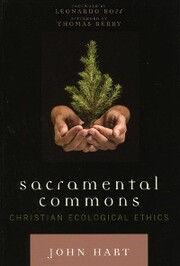Detailansicht
Sacramental Commons
eBook - Christian Ecological Ethics, Nature's Meaning
ISBN/EAN: 9781461643203
Umbreit-Nr.: 1207618
Sprache:
Englisch
Umfang: 274 S.
Format in cm:
Einband:
Keine Angabe
Erschienen am 27.07.2006
Auflage: 1/2006
E-Book
Format: EPUB
DRM: Adobe DRM
- Zusatztext
- The increasing awareness of environmental issues as ultimately moral issues has led to the intersection of religion and environment. Sacramental Commons presents a unique way of looking at this topic by relating the Christian word 'sacrament' (signs of divine presence)to the term 'commons' (shared place and shared goods, among people and between people and the natural world), suggesting that local natural settings and local communities can be a source for respect and compassion. Sacramental Commons uses Earth-oriented biblical teachings, and ideas from such thinkers as Hildegard, St. Francis, John Muir, and Black Elk, to provide insights about divine immanence in creation, human commitments to creation, and human accountability to the Spirit, Earth, and biotic community. It extends the concept of 'natural rights' beyond humans to include all nature, and affirms intrinsic value in ecosystems in whole and in part. Sacramental Commons declares that the Earth commons and its goods should be shared equitably by human communities and individuals living in interdependent relationships with other members of the community of life. It suggests essential values that will stimulate care for the commons, and embodies them in principles of an innovative Christian Ecological Ethics.
- Kurztext
- The increasing awareness of environmental issues as ultimately moral issues has led to the intersection of religion and environment. Sacramental Commons presents a unique way of looking at this topic by relating the Christian word 'sacrament' (signs of divine presence) to the term 'commons' (shared place and shared goods, among people and between people and the natural world), suggesting that local natural settings and local communities can be a source for respect and compassion.
- Autorenportrait
- John Hart is Professor of Christian Ethics at Boston University, teaching courses in social ethics, environmental ethics, liberation theology, science and Christianity, and social and ecological justice. His other books include What Are They Saying About...Environmental Theology?, Ethics and Technology: Innovation and Transformation in Community Contexts, and The Spirit of the Earth-A Theology of the Land.
